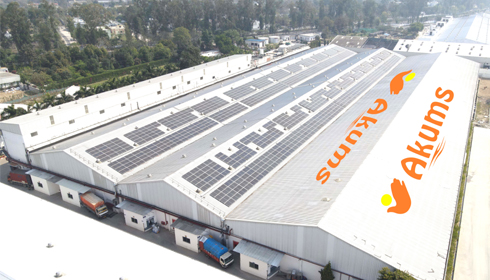
Akums Sets Sustainability Benchmark with India's Largest Rooftop Solar Plant
In a significant move toward sustainability, Akums Drugs & Pharmaceuticals Limited, India's foremost contract development and manufacturing organisation (CDMO) has erected a 600 kWp on-grid rooftop solar power plant at its warehouse in Haridwar, Uttarakhand. The solar panel system, which covers 56,000 square feet (0.52 ha), is estimated to create more than 7.5 lakh units of solar power each year, helping to conserve the environment while also saving money.
For Haridwar locals and millions across India, projects like Akum's solar power plant represent a hopeful transition towards cleaner energy alternatives. As India struggles with worrisome pollution levels and an increasing reliance on coal-fired power, every step towards renewable energy means cleaner air and healthier communities. According to the Centre for Science and Environment (CSE), India relies on fossil fuels for 75% of its electricity, which contributes to poor air quality and respiratory ailments, particularly in cities. Akums' solar project has the potential to offset these issues by lowering its carbon footprint and reducing emissions equivalent to 10,000 trees per year.
The impact goes beyond environmental improvements. Akums predicts significant annual electricity bills. This reduction in energy expenditures translates into increased investment in sustainable practices, supporting the company's commitment to environmentally friendly operations. At the inauguration ceremony, Akum's managing director and founder, Shri Sandeep Jain, emphasised the company's dedication to sustainability by successfully commissioning a rooftop solar power plant. This project will help minimise energy costs, reduce our carbon impact, and promote a cleaner future. Akums remains dedicated to implementing green practices in our operations and assisting India in meeting its sustainability goals."
As part of the Paris Agreement obligations, India plans to get 50% of its energy from renewable sources by 2030, and efforts like Akums' rooftop solar plant play an important role in achieving this goal. Akums' initiatives demonstrate how Indian enterprises may take real action in support of India's national goals, showing that sustainable growth is possible when businesses prioritise environmental stewardship.
Akums' Green Model may motivate other pharmaceutical corporations to follow suit. The healthcare and pharmaceutical industries, which are notorious for their high energy consumption due to manufacturing and storage operations, can dramatically minimise their environmental impacts by using solar technology. According to a survey by TERI (The Energy and Resources Institute), India's pharmaceutical business accounts for roughly 3% of the country's greenhouse gas emissions, highlighting the need for greener operational approaches.
Akums has erected solar panels in Haridwar, which serves as both a spiritual destination and a thriving industrial zone. Industrialisation has spurred economic progress in the region, but it has also raised worries about increased pollution and unsustainable resource usage. Local residents have frequently expressed concerns about rising pollution levels and declining green cover. Akums' adoption of solar electricity alleviates these issues while also confirming its status as an ethical corporate citizen.
The solar installation also serves as an encouragement to local businesses. Mr Rakesh Sharma, a local environmental activist, believes that Akums' investment in renewable energy sends a significant message to smaller businesses in Haridwar and beyond. It demonstrates that green energy is more than just a show; it's a realistic, cost-effective, and responsible business decision.
Akums' solar power project is consistent with India's larger Renewable Energy Mission and National Solar Mission, which seek to cut carbon emissions while promoting energy security. With over 770 million people in India still reliant on conventional biomass for cooking and heating, initiatives that encourage solar adoption can have a knock-on impact in guaranteeing energy equity and access to clean power.
Furthermore, Akums' goal is consistent with India's pledge to cut its carbon intensity by 45% by 2030, as announced at COP26. By utilising solar energy, Akums contributes to climate action and encourages energy independence, lowering reliance on traditional power sources.
Akums' use of solar electricity is more than just a commercial choice; it demonstrates forward-thinking corporate responsibility. In a country where climate change is becoming increasingly urgent, businesses like Akums demonstrate that sustainability and prosperity can coexist. Akums is pioneering the use of clean energy in the pharmaceutical industry and other sectors. As India strives to meet its renewable energy targets, the role of corporate leaders in fostering environmental change becomes critical.